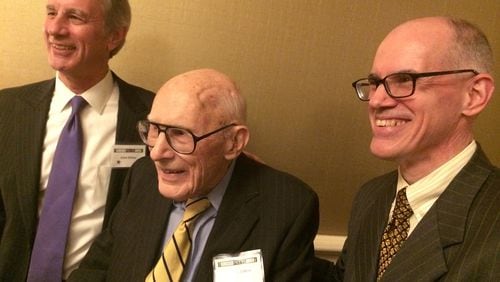RELATED: A timeline of Sitton’s life
He grew up on his daddy’s farm in Rockdale County during the 1930s, working side-by-side with African-American sharecroppers. As a teen, he loved politics so much he skipped school to go watch the state Legislature.
Three decades later, Claude Sitton set the standard for reporting on the civil rights movement. His stories in The New York Times were reliable, scrupulously fair and detail-driven. They offered no quarter to the white supremacists who didn’t want their discrimination and violence exposed, but they didn’t romanticize the struggle for equal rights.
Newsweek praised him in 1964 as “the best daily newspaperman on the Southern scene.”
“He got where no one else was. It was hustle, and a determination to see it with his own eyes,” said Hank Klibanoff, who teaches journalism at Emory University and who co-authored “The Race Beat: The Press, the Civil Rights Struggle, and the Awakening of a Nation.”
Recently, Sitton, 89, sat in a wheelchair by his bed at the A.G. Rhodes Health and Rehabilitation center in Atlanta and talked about his life. His hearing was poor, he was on oxygen, and congestive heart failure had left him weakened.
“I had the greatest newspaper job in the world. I had the opportunity to go out and find out the top story in the field, and get into the middle of it,” Sitton told The Atlanta Journal-Constitution. “I wanted to tell what was going on, but more importantly, why.”
Sitton died on Tuesday. His son, Clint Sitton, said the family plans a private service at graveside but no public memorial or funeral. Sitton will be buried at the Monastery of the Holy Spirit in Conyers.
Thrust into action
Sitton was hardly fresh off the farm when he landed the job with The New York Times. He had done stints with the Merchant Marine and the Navy during World War II, serving on a landing ship in the battles to retake the Philippines.
He had interviewed Joe Louis after the champ retired from boxing and covered the death of famed Atlantan Margaret Mitchell, the author of “Gone With the Wind.”
Shortly after becoming the chief Southern correspondent for the Times in 1958, the 32-year-old was thrust into the recurring racial upheavals in Little Rock, Ark. The pace hardly let up for the next six years as he reported on the flash points and shifting fault lines of the civil rights struggle.
“Nobody in the news business would have as much impact as he would – on the reporting of the civil rights movement, on the federal government’s response, or on the movement itself,” Klibanoff and co-author Gene Roberts wrote in their book.
“He was always there,” recalled former Atlanta Mayor Andrew Young, who worked for civil rights alongside Dr. Martin Luther King Jr. during those years. “He was always trying to be objective.”
Sitton cut a deeper groove into the race beat than other reporters. He moved faster; colleagues say he even walked faster. He had better sources, as many civil rights leaders carried his phone number in their pockets, almost like an insurance policy. They knew that if the Times guy was around, the eyes of the world were watching, Klibanoff said.
Still, Sitton kept his journalistic distance.
“He acted like he didn’t believe a word we told him,” Young said. “He wanted to check it out. He always thought we were trying to sell him a bill of goods.”
Sitton smiled when an AJC reporter related Young’s comment, indicating he thought that was a bit of an exaggeration.
U.S. Rep. John Lewis, another lion of the Civil Rights era, said, “He was one of the bravest, [most] courageous journalists I ever met.”
Sitton, tough but hardly foolish, often traveled with Newsweek reporter Karl Fleming.
“They went into some of the most troublesome places,” Lewis said. “And they got the story. And sometimes you would only see Claude Sitton and Karl Fleming out there working. He was a wonderful human being.”
Sitton was there when white riots broke out over the desegregation of Ole Miss in 1962, and when police turned water hoses and dogs on hundreds of protesters in Birmingham in 1963. Working out of his Atlanta office in the old Atlanta Constitution and Atlanta Journal building downtown, he traveled to Alabama when Gov. George Wallace blocked the schoolhouse door in 1963, and then quickly to Jackson, Miss., to cover the murder of NAACP leader Medgar Evers. He wrote about the sit-ins, jail-ins, the Freedom Rides, capturing the defining stories as a nascent civil rights struggle grew into a national movement.
It was a time when the news media was integral to bringing change, illuminating for the nation the horrors that black Southerners endured under Jim Crow. Jack Nelson, the late Pulitzer-prize winning reporter for The Atlanta Constitution, described it as an era when “the press had a profound impact on the most dramatic and important domestic revolution of the 20th century.” Nelson recalled that the Times was “far out in front of covering the story.”
Stories that moved presidents
Sitton didn’t pull punches in his stories. When protesters secured few gains in Albany, Ga., he took readers inside the fraying coalition between Martin Luther King’s Southern Christian Leadership Conference and the more youth-oriented Student Nonviolent Coordinating Committee.
“Negro Groups Split on Georgia Protest” was among the headlines.
At times, Sitton’s stories irritated civil rights leaders.
“Sitton seemed to delight in writing the obituary of nonviolence and Martin’s leadership,” Young wrote in his 1996 book “An Easy Burden.” The passage particularly addressed Sitton’s coverage of the Albany campaign. “Sitton’s analysis was logical, but it did not count on the deep and abiding religious commitment of blacks and whites in the American South, or Martin’s inner strength.”
Sitton, for his part, didn’t care to make friends on either side of the battle.
“I had no given philosophy. Just that of a good journalist – cover the news as straight and as truthfully as possible,” he said.
He hailed from nonconformist stock. While his family had roots in the Confederacy, they were, in the 1930s and 40s, decidedly against segregationist Georgia Gov. Eugene Talmadge, who was elected four times to the office.
Working closely with blacks on his family’s farm shaped many of Sitton’s views.
“They were all hard-working,” Sitton said. “I was taught to plow by an old fellow, Gus. He taught me how to plow through a cotton patch without knocking down any plants.”
During the civil rights era, he felt blacks were simply trying to obtain the rights that every person deserves.
His stories, often appearing on the front page of the Times and in newspapers around the world, sometimes moved presidents to action. When John Kennedy and his brother, Bobby, read Sitton’s account of a Terrell County sheriff disrupting a voting rights rally, they sent FBI agents to investigate voting rights violations in south Georgia.
That story is filled with you-are-there detail. No one is beaten or killed in the narrative, which ran on the front page of the Times on July 27, 1962. Sitton showed another level of discrimination: day-in and day-out intimidation and fear.
The story leads with a quote by Terrell County Sheriff Z.T. Mathews, addressing the 38 blacks and two whites gathered in the Mount Olive Baptist Church: “We want our colored people to go on living like they have for the last hundred years.”
As Mathews spoke, a deputy swaggered back and forth fingering his gun belt as another “slapped a five-cell flashlight against his left palm again and again,” Sitton wrote.
Sitton described how those gathered offered song and prayer, but that the angry voices of the whites outside drowned out the chirping of crickets. The deputies called out license plate numbers, making it clear they were recording the identities of those inside. “And the faces of the audience stiffened with fear.”
Sitton had guts, too. Bill Shipp, a former political editor for The Atlanta Constitution, covered that same church meeting. The sheriff questioned the reporters there, Shipp said. When he got to Sitton, he got a surprise.
“What are you?” Mathews asked Sitton.
“I’m an American, sheriff,” Sitton responded. “What are you?”
“Claude was an audacious guy, confronting police and other officials,” Shipp recalled. “And if he did it, we did too.”
Time away from family
Another time, a hotel owner attempted to intimidate Sitton, Klibanoff said. Sitton responded angrily, “Look, tell these folks they can shoot me. But I guarantee you there will be five just like me to get off the plane at Jackson airport tomorrow, and they’ll be right up here to cover the story. It won’t do you any good.”
Sitton also had a few tricks up his sleeve. He learned that if he positioned a notepad a certain way in his top pocket, it looked like he was carrying a gun. That, he realized, made people think he was an FBI agent, which protected him.
Still, all the hustle and bustle robbed him of time with family. Weeks, sometimes months, passed away from home. Sometimes, he would meet his wife, Eva, for a cup of coffee while transferring flights at the Atlanta airport. On one occasion when he came home, he noticed that his little boy, Clint, had begun talking.
Sitton recalled that his wife told him, “He’s been talking for a month or two.”
These days, Sitton’s son, Clint, is an Atlanta attorney. He specializes in civil lawsuits, inspired, he said, by his father’s work to provide a voice for those who don’t have one.
“We grew up in a color-blind home, where the thinking was that everybody deserves respect, until they prove otherwise,” Clint Sitton, 57, said. “He also taught me not to be too respectful of authority – except his.”
Claude Sitton went on to serve as national editor at the Times, and then several top positions at The News & Observer in Raleigh, where he won the Pulitzer Prize for commentary in 1983.
Those jobs afforded him more family time. His son remembers robust political discussions around the dinner table. Sitton enjoyed nothing so much as a passionate exchange of ideas. “It was like a sport to him,” his son recalled.
The family returned to metro Atlanta around 1990, settling in Oxford, not far from Covington. Sitton helped start the journalism program at Emory.
He spent his later years serving as a community watchdog over local officials in Oxford, not far from where he grew up. He regularly attended city council meetings and weighed in on local issues, from the proposed expansion of the airport in Covington to the city’s privatization of garbage collection.
“Claude was always there,” said Oxford Mayor Jerry Roseberry, who lived about a block away from Sitton. “He was always prodding me and the council. You could tell he’d been good about his job. He kept us on our toes.”
Roseberry recalled that Sitton would regularly excoriate the mayor and council during public meetings. He was often accompanied by his wife, a former reporter who was also pretty outspoken.
“He would give me such a hard time during the meetings,” Roseberry said. “But then he would call me up later and tell me I was doing a good job.”
In addition to his son, Clint, Sitton is survived by his wife, Eva Whetstone Sitton; a son, Claude (Mac) McLaurin Sitton of Decatur; two daughters, Suzanna F. Greene of Raleigh, N.C; and Lauren Lea Stanley of Philadelphia; and 10 grandchildren.
In lieu of flowers, the family suggests memorial contributions be made to the Oxford College Scholarship Fund, at the Oxford College Development Office, 711 Emory St., Oxford, Ga. 30054; the Salvation Army, at Salvation Army National Headquarters, P.O. Box 269, Alexandria, Va. 22314; the Nature Conservancy, Attn. Treasury, 4245 N. Fairfax Drive, Ste. 100, Arlington, Va. 22203-1606; or a charity of one’s choice.
About the Author






